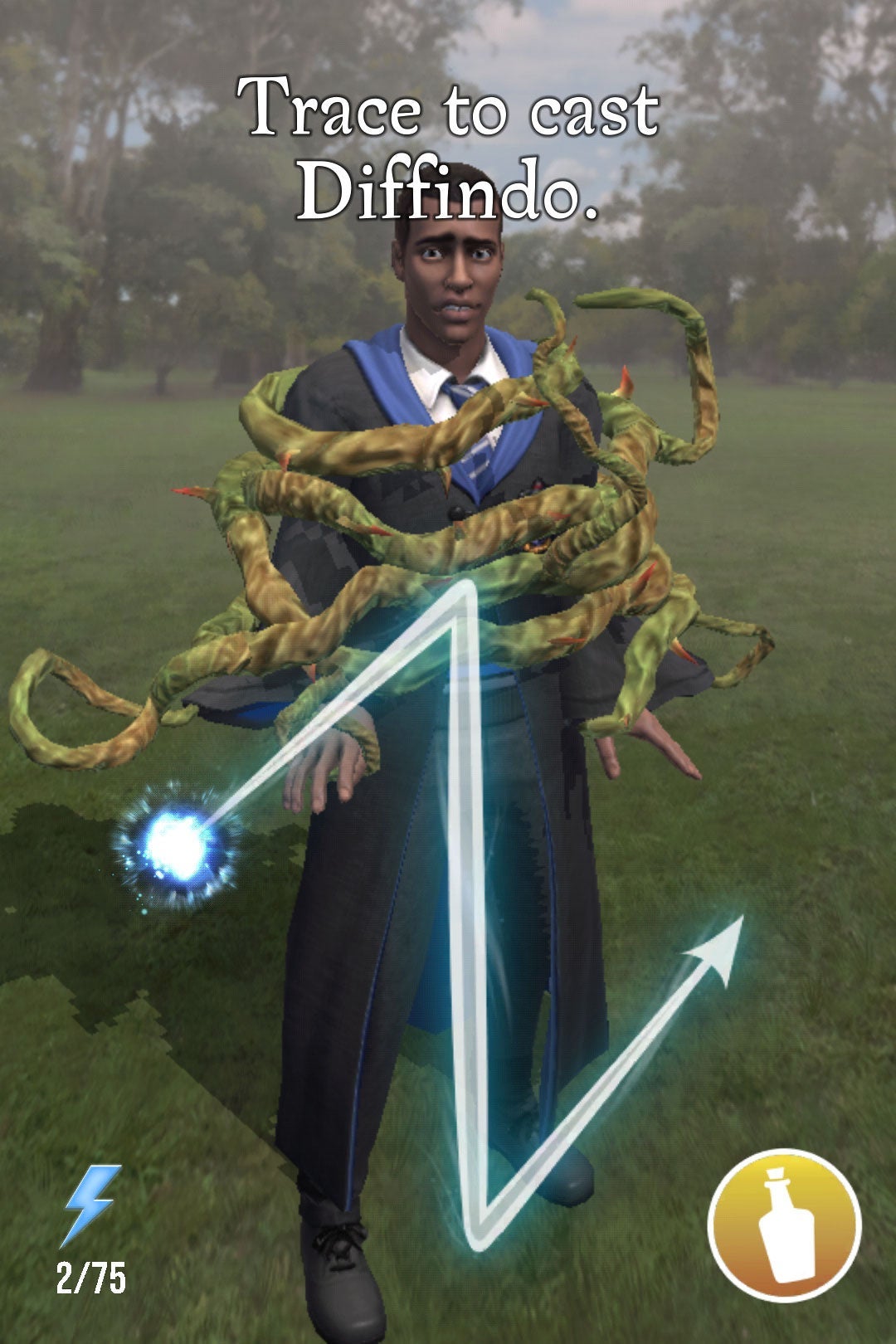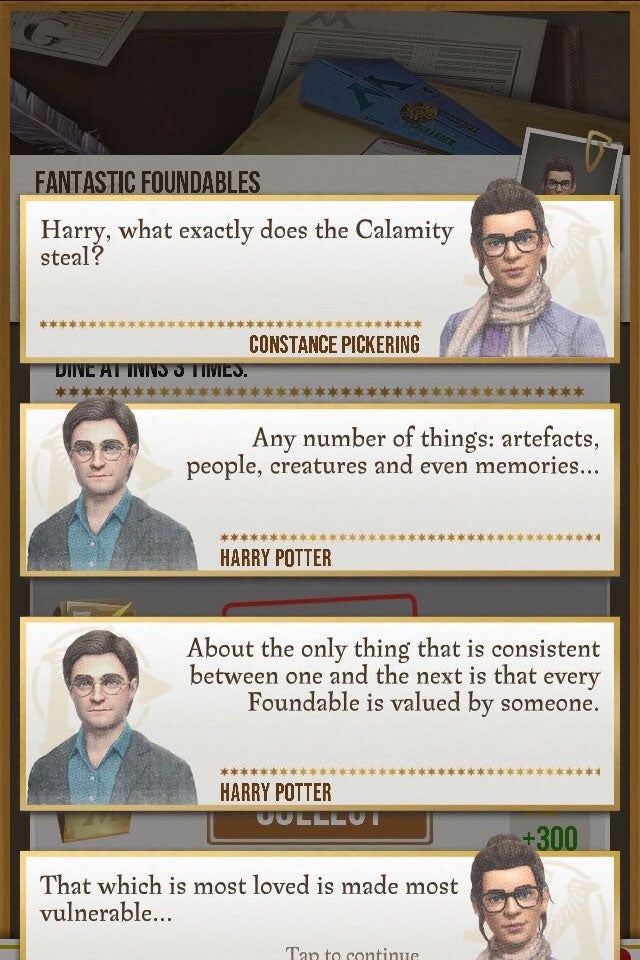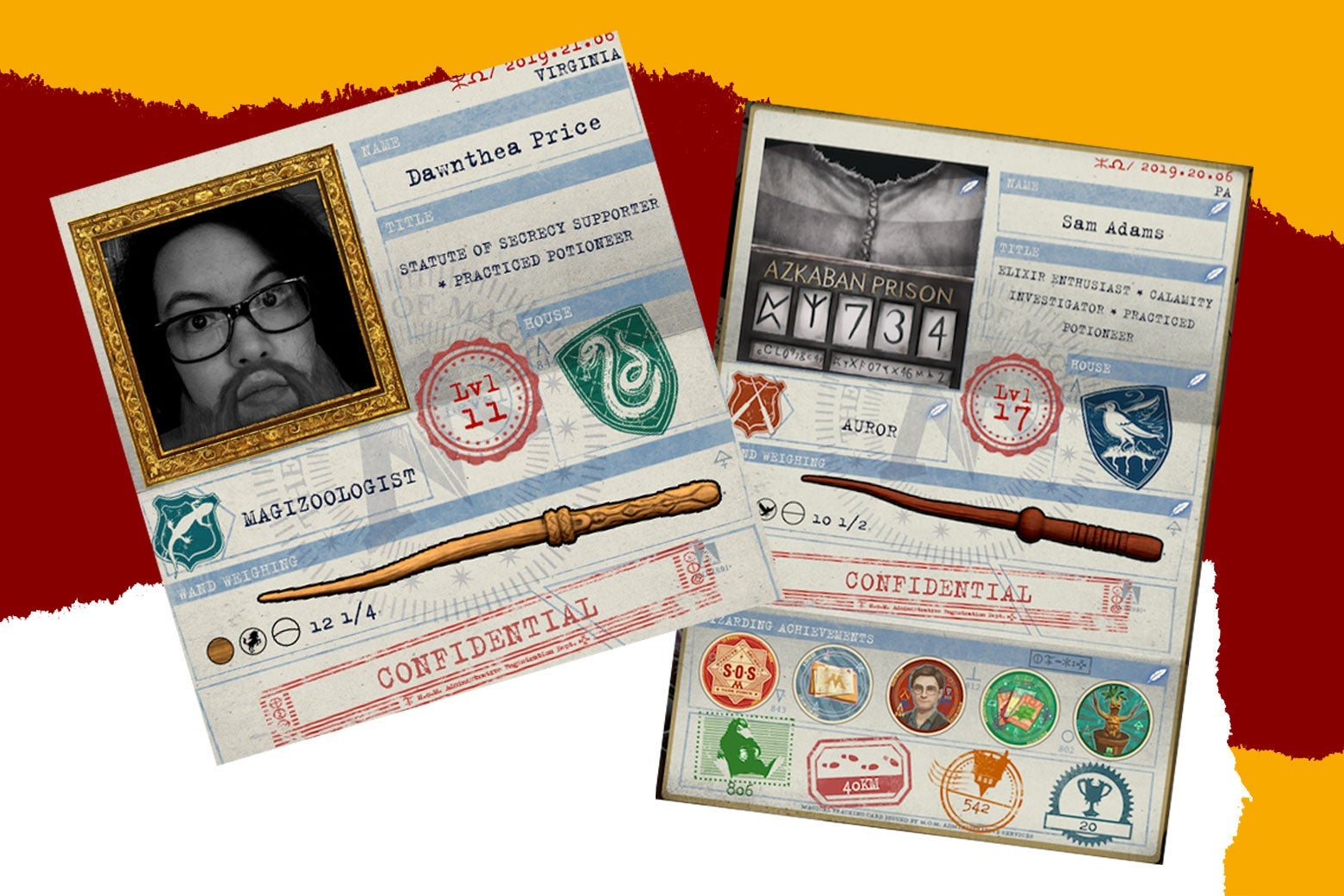Dawnthea Price: Let’s jump right in. Sam, how are you enjoying Harry Potter: Wizards Unite, the new game from Niantic and WB Games San Francisco?
Sam Adams: I don’t know if I’ve graduated to “enjoying” it yet, but after several days of playing, it’s holding my interest, which is a good place to start. The game builds on the underlying structure of Niantic’s Pokémon Go, a GPS-based game where you travel through the real world hunting down creatures and adding them to your collection. (I am informed the ultimate goal is to “catch ’em all.”)
Wizards Unite starts with that same principle—you walk around and find stuff—but it adds several twists and complications. Instead of catching Pocket Monsters, you’re retrieving “foundables,” which are, um, things that need to be found. I’ll be honest—I’m barely paying attention to the story elements, which I guess are supposed to be an added draw for Harry Potter fans. I can’t click through those dialogue bubbles fast enough. How is it going for you?
Price: It’s … hard? It’s way harder than Pokémon Go, which only requires a passing understanding of Pokémon and vague hand-eye coordination. Wizards Unite’s premise is that these magical foundables are stuck in the non-magical Muggle world, which means the secretive wizarding world is at risk, so you have to free the foundables and send them back where they belong. But the primary “play” mechanic in Wizards Unite is speed tracing, and I do not like that at all. It feels really arbitrary when I perfectly trace a spell’s shape with my finger to free a foundable, but then I get dinged for taking too long. Magic shouldn’t be so sloppy!
In Pokémon Go, failure meant a Pokémon would run away, a common occurrence in the mainline games. Here, you literally watch a foundable disintegrate in front of you, but there’s no backstory for why these people or objects would disintegrate, and I find it distressing. That’s a very different feeling from when I effortlessly manage an excellent Poké Ball throw, and not very “just swish and flick” of Wizards Unite, in my opinion.

I despise the spell-casting energy—that’s the number on the bottom left. I have literally two attempts left to beat this, or the game will attempt to make me pay 100 coins to get more energy. It is very frustrating! Energy seems more geared toward time-gating your play or otherwise forcing you to find inns and greenhouses, the places where you can replenish energy as well as gain potion-making ingredients. That is not fair to people who want to play this game in rural or less inn’d areas. I made that complaint in 2016 when Pokémon Go launched, and given that it’s been a consistent drumbeat for players of Niantic’s other game, Ingress, for the better part of a decade, that feels like a very willful “fuck you, move to the city” on their part.
Adams: Either that or a “give us some money now” move.
Price: Ugh, you’re probably right. But I’m loving the post-Hogwarts lore. Having grown up at the height of both Pokémon and Harry Potter fever, I feel targeted by all of Niantic’s doings. As far as progression, though, how are you leveling up so quickly??? This just released, and you’ve zoomed to Level 16.
Adams: I confess that my emotional involvement with the Harry Potter franchise ended with Deathly Hallows. I’ve seen Cursed Child and both Fantastic Beasts movies in part because I now have a daughter to take with me, but I could not explain the plot of either at gunpoint. So for me the game is really about repetition compulsion, and, if I’m honest, the sense that, somewhere down the line, there might be a blog post in it.

My experience with Pokémon Go was that the game didn’t really start being the game until you hit Level 20, and I’ve been operating under the assumption that Wizards Unite works about the same way, so in addition to the little dopamine burst of hitting a new level, I’ve been powering through to get to the point where I can make an informed decision about whether to keep playing or not. In practical terms, I’ve got a dog who likes long walks on the weekend, so I combined a few of the game’s brain elixirs, which double your XP, with stored-up portkeys—basically the equivalent of Pokémon Go’s eggs, which hatch by walking, except that in this case you can control when you cash them in for maximum impact. That and I may just live on a lucky block; it seems like every time I open up the game, there’s a half-dozen foundables waiting around to be caught.
I do find the tracing mechanic to be kind of annoying, and worse, there doesn’t seem to be any learning curve. I don’t feel particularly better than when I started. Wizards Unite is way more detailed than Pokémon Go—among other things, the game allows you to download and store its assets, so the encounters are way more visually rich—but there’s something physical about throwing a Poké Ball just right that tracing a shape in the air just doesn’t match. What’s your favorite part of the game so far?
Price: This is definitely the copy editor in me, but the level of detail Wizards Unite has achieved is astounding. It’s clear the developers endeavored to improve upon the very lucrative but mechanically simple formula that made Pokémon Go such a success. Adding the long dialogues between the wizarding world’s most visible characters—your character “works” for adult Harry Potter and Hermione Granger—is sort of heartwarming and just inside baseball enough for me to appreciate as a longtime fan.
But it’s also the details in the foundables. They don’t just capitalize on Things You Recognize from the books, original movies, Pottermore, or the Fantastic Beasts series; there are a host of items and creatures from very old lore all the way back to Rowling’s Fantastic Beasts and Where to Find Them (a reference book only vaguely related to the current series of movies) and Quidditch Through the Ages. Seeing that I’ve returned a hag to Russia, or a billywig to Australia, just tickles my fancy. And I love being able to go back and read more about all my foundables in the Registry, which is a really fancy word for digital sticker book. It’s a neat upgrade of the Pokédex, and it also rewards repeat players more generously.
But who, exactly, is this game for? Forever nerds like me, or people who regularly travel long distances like you, or Pokémon Go players who finished everything and want something new, or someone else? And even though it’s got “more” than Pokémon Go, would you actually consider this a “game”? There is a pervasive notion that mobile titles are barely games, by default, and that Niantic in particular is more “gamifying” exercise than creating games themselves.
Adams: I really agree on the level of detail, which might be my main source of pleasure in the game. I love the way inns swivel toward you when you’re in range and have chimneys that bellow smoke until the five-minute cooling-off period is over. The animation really captures the characters from the films. Ron Weasley gives you an awkward “hey” wave when you save him, and Luna Lovegood rocks a perfect miniskirt-and-leggings look. (I do wonder if the actors are getting paid for the use of their likeness, but that’s between them and their agents.)
As for who it’s for, most of what I’ve seen is Pokémon Go players giving the game a spin, although the initial numbers indicate that Wizards Unite’s launch isn’t anything like the event Pokémon Go’s was. It’s definitely knocked Pokémon Go out of the first-thing-in-the-morning slot for me, especially since I’ve already reached most of the attainable goals in the former. I don’t have a Torkoal or a Relicanth, but since I’m not planning any trips to India or New Zealand in the near future, I’ve reconciled myself to doing without.
And whether Wizards Unite is a game, I’d say yes, maybe even more so than Pokémon Go. And I’m not sure I like that part. The thing I like about Pokémon Go is it can sit in the background, logging kilometers while you walk around and letting you know if something you don’t already have is in your vicinity. Wizards Unite is designed to be more constantly played, throwing objects out for you to collect with no way for you to determine whether they’re worth your attention before you click on them. It also allows you to reset the trophy case once you’ve found every item in it, which raises the level of difficulty and reward but also makes you feel like you’re just running in circles.
One addition we haven’t talked about—perhaps revealingly—is the wizarding challenges, which add an element of dungeon crawling. You pick a character type and enhance your skills as you go, ducking into fortresses and fighting enemies, who give you stuff when they die. My understanding is you’ll need to get better at these to retrieve some of the rarer items. This is also, apparently, where the collective element of the game comes in, although I haven’t had any experience with team play, and the fact that, unlike Pokémon Go’s timed raids, Wizards Unite’s seem to be always available diminishes the chance that you’ll turn up at the same time as someone else. Have you teamed up with anyone, and what do you think about this new wrinkle?
Price: Removing the competitive aspect of teams (Team Instinct forever!) and implementing cooperative challenges seems to be a welcome reframing of how group play should work, too. My Magizoologist skill set has a lot of options to support other players during challenges, and along with the other classes, Auror and Professor, the roles neatly fulfill the classic RPG triangle of damage, tank, and support.
But unlike with Pokémon Go’s raids and timed events, I have yet to run into a single Wizards Unite player in the wild. I know there are several in my neighborhood, because they’ve left foundable lures on my local inns, but I’ve seen no telltale signs of a fellow wizard—you know, the random person awkwardly standing in the middle of a sidewalk or by a tree, oddly fixated on their phone, making repetitive motions? I’ve already accrued several healing spells to help whenever it finally happens. Thankfully, I can take down several ranks of challenges all by myself, a welcome improvement that really incentivizes improving my own skills.
Perhaps this is my chief complaint with Wizards Unite, though: There might be too much on offer, so it ultimately feels more like work than fun. We’ve broken down so many of the new things it’s brought versus its predecessors, and it still feels like we haven’t even scratched the surface. Whereas Pokémon Go felt very bare bones at the outset, Harry Potter: Wizards Unite feels like an overstuffed burrito. It has a lot of things I love, but it might make me sick.
Adams: My rule of thumb with mobile games especially is that if have to go and read things to understand how to play, I don’t do either, and Wizards Unite is right on the line. I still don’t know what “Focus” is or how it’s meant to help you in combat, and although I know I could just Google it, I don’t want to have to. Pokémon Go certainly has its complicated aspects, but there’s a beautiful simplicity to its core concept, and Wizards Unite feels overworked and overthought. There’s so much to do it’s almost overwhelming, and if I had to predict, I’d guess that I’m going to burn out on the game in a week or two. Not Pokémon Go, though. I’ve still got to catch a Gible.
Price: In the time we’ve been talking, I’ve lost multiple high-threat foundables in Wizards Unite but successfully caught a Turtwig in Pokémon Go. That’s probably a metaphor. I’m going to play Wizards Unite until it kills my phone battery for good, though. When it comes to Harry Potter, I’m in way too deep.
